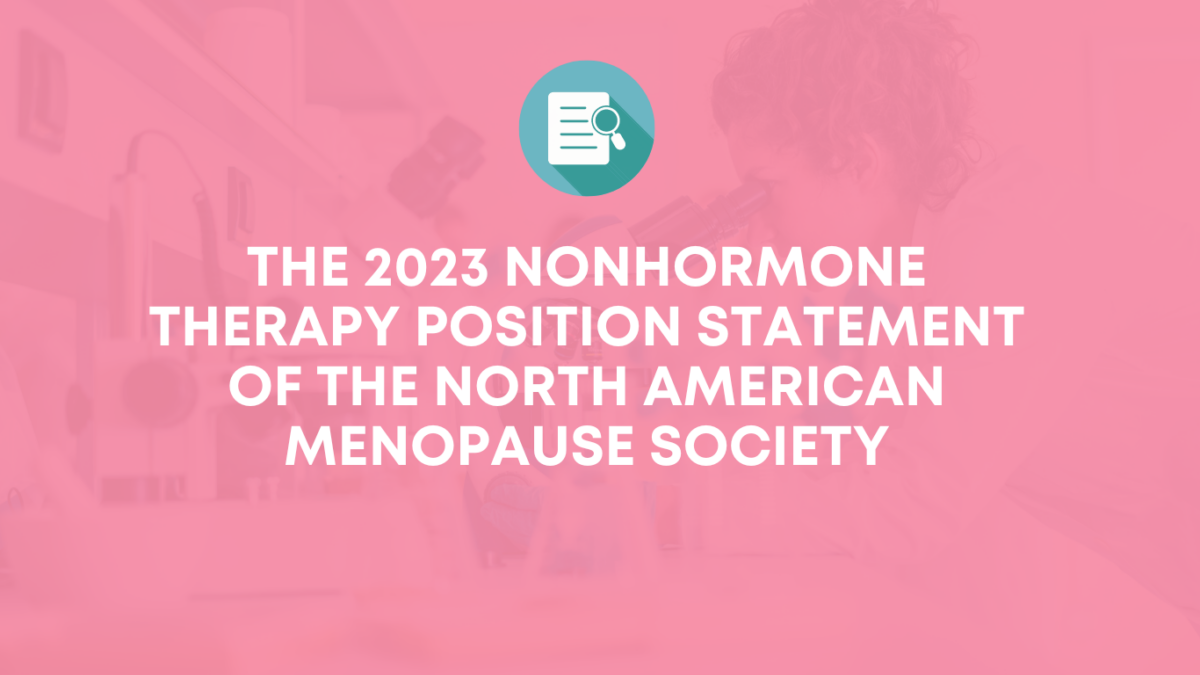NAMS Published Position Statement on Non-Hormonal Approaches to Manage Hot Flashes and Night Sweats

The North American Menopause Society (NAMS) has released its most recent stance on non-hormonal remedies for symptoms like hot flashes and night sweats. The statement was made public online on June 1, 2023, in The Journal of The North American Menopause Society, under the title “The 2023 nonhormone therapy position statement of The North American Menopause Society.”
As hormonal replacement therapy (HRT) is not an option for some women, while others opt for non-hormonal methods, the NAMS orchestrated a panel of experts to conduct an extensive evaluation of the latest studies on non-hormonal remedies for hot flashes. This panel, comprising medical practitioners and researchers who specialize in non-hormonal medical treatments, herbal remedies, behavioral therapy, and lifestyle changes, meticulously scrutinized research materials published since 2015. Their compiled report advocates an array of non-hormonal interventions for easing hot flashes.
One such intervention is Cognitive Behavioral Therapy (CBT), which aims at transforming thought processes and behavioral patterns to assist individuals in effectively managing various issues. Research indicates that CBT can alter women’s perception of hot flashes, making them seem less problematic.
Another viable option is Clinical Hypnosis, a mind-body intervention that enables individuals to achieve a highly relaxed yet alert state, facilitating life changes through mental visualization and suggestion. This therapy has been proven to effectively manage pain and anxiety, and studies demonstrate its efficacy in reducing both the frequency and intensity of hot flashes.
Furthermore, weight reduction, especially during the onset of menopause, has been linked to a decrease in the number and intensity of hot flashes in some women.
In addition, certain antidepressants, specifically Selective Serotonin Reuptake Inhibitors (SSRIs) and Serotonin-Norepinephrine Reuptake Inhibitors (SNRIs), have been associated with slight to moderate improvements in hot flashes. Notable SSRIs include Celexa (citalopram), Lexapro (escitalopram), Prozac (fluoxetine), and Paxil (paroxetine), with the latter having an FDA-approved low-dose variant branded as Brisdelle specifically for hot flashes. Prominent SNRIs encompass Cymbalta (duloxetine), Effexor (venlafaxine), and Savella (milnacipran). Moreover, Gabapentin, typically prescribed for epilepsy and diabetes-related nerve pain, has shown promise in diminishing the frequency and severity of hot flashes.
Another medication, Oxybutynin, used primarily for managing overactive bladder syndrome, has demonstrated efficacy in mitigating moderate to severe hot flashes. However, caution is advised for prolonged use, particularly among the elderly, as it has been linked to cognitive decline.
Recently in 2023, the FDA approved Veozah (fezolinetant) specifically for treating hot flashes. Stellate ganglion blockade, or nerve block, may also relieve moderate to extremely severe hot flashes.
However, the panel did not recommend several therapies including paced respiration, herbal supplements, exercise, yoga, soy products, cannabis, acupuncture, chiropractic manipulation, dietary modifications, clonidine, Lyrica, cooling methods, and avoiding certain triggers.
Dr. Chrisandra Shufelt, a women’s health specialist at the Mayo Clinic and the chair of the advisory panel, highlighted the significance of the position statement, stating that it will empower healthcare professionals to competently direct women towards efficacious non-hormonal therapies while discouraging the use of unsuitable or ineffective ones.
For individuals with a history of breast cancer seeking non-hormonal hot flash treatments, this position statement provides an array of alternatives. It is advisable to bring this statement to your healthcare provider to explore the options that best cater to your specific needs.
Note: NAMS is a multi-disciplinary association, bringing together professionals from diverse fields such as medicine, nursing, sociology, psychology, nutrition, epidemiology, and pharmacy, among others. The society strives to enhance the health and lifestyle of women during their midlife and beyond by fostering an understanding of menopause and promoting healthy aging.
Feel free to share this with anyone who’ll benefit from this.
